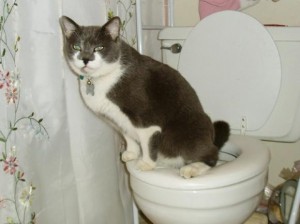Dangers of Disposing Cat Poop in Your Toilet - Precautionary Measures
Dangers of Disposing Cat Poop in Your Toilet - Precautionary Measures
Blog Article
Just how do you actually feel in relation to How to Dispose of Cat Poop and Litter Without Plastic Bags?

Intro
As feline owners, it's essential to bear in mind just how we dispose of our feline good friends' waste. While it may appear convenient to purge feline poop down the commode, this practice can have detrimental effects for both the atmosphere and human wellness.
Alternatives to Flushing
The good news is, there are more secure and extra liable ways to deal with cat poop. Take into consideration the adhering to choices:
1. Scoop and Dispose in Trash
The most usual method of dealing with feline poop is to scoop it right into an eco-friendly bag and toss it in the garbage. Make sure to use a specialized trash inside story and take care of the waste quickly.
2. Use Biodegradable Litter
Select eco-friendly cat clutter made from materials such as corn or wheat. These trashes are eco-friendly and can be safely disposed of in the trash.
3. Hide in the Yard
If you have a backyard, consider burying pet cat waste in a marked area away from vegetable gardens and water resources. Make certain to dig deep adequate to stop contamination of groundwater.
4. Mount a Pet Waste Disposal System
Buy a pet garbage disposal system specifically designed for pet cat waste. These systems make use of enzymes to break down the waste, minimizing odor and ecological impact.
Health Risks
Along with environmental concerns, purging pet cat waste can likewise position wellness dangers to humans. Pet cat feces might include Toxoplasma gondii, a bloodsucker that can trigger toxoplasmosis-- a possibly severe health problem, especially for pregnant females and individuals with damaged immune systems.
Ecological Impact
Flushing pet cat poop introduces unsafe microorganisms and bloodsuckers into the water system, presenting a significant risk to water ecological communities. These pollutants can negatively influence aquatic life and concession water quality.
Conclusion
Responsible family pet possession prolongs beyond supplying food and sanctuary-- it also includes correct waste management. By avoiding flushing feline poop down the bathroom and selecting alternative disposal approaches, we can minimize our environmental footprint and protect human health.
Why Can’t I Flush Cat Poop?
It Spreads a Parasite
Cats are frequently infected with a parasite called toxoplasma gondii. The parasite causes an infection called toxoplasmosis. It is usually harmless to cats. The parasite only uses cat poop as a host for its eggs. Otherwise, the cat’s immune system usually keeps the infection at low enough levels to maintain its own health. But it does not stop the develop of eggs. These eggs are tiny and surprisingly tough. They may survive for a year before they begin to grow. But that’s the problem.
Our wastewater system is not designed to deal with toxoplasmosis eggs. Instead, most eggs will flush from your toilet into sewers and wastewater management plants. After the sewage is treated for many other harmful things in it, it is typically released into local rivers, lakes, or oceans. Here, the toxoplasmosis eggs can find new hosts, including starfish, crabs, otters, and many other wildlife. For many, this is a significant risk to their health. Toxoplasmosis can also end up infecting water sources that are important for agriculture, which means our deer, pigs, and sheep can get infected too.
Is There Risk to Humans?
There can be a risk to human life from flushing cat poop down the toilet. If you do so, the parasites from your cat’s poop can end up in shellfish, game animals, or livestock. If this meat is then served raw or undercooked, the people who eat it can get sick.
In fact, according to the CDC, 40 million people in the United States are infected with toxoplasma gondii. They get it from exposure to infected seafood, or from some kind of cat poop contamination, like drinking from a stream that is contaminated or touching anything that has come into contact with cat poop. That includes just cleaning a cat litter box.
Most people who get infected with these parasites will not develop any symptoms. However, for pregnant women or for those with compromised immune systems, the parasite can cause severe health problems.
How to Handle Cat Poop
The best way to handle cat poop is actually to clean the box more often. The eggs that the parasite sheds will not become active until one to five days after the cat poops. That means that if you clean daily, you’re much less likely to come into direct contact with infectious eggs.
That said, always dispose of cat poop in the garbage and not down the toilet. Wash your hands before and after you clean the litter box, and bring the bag of poop right outside to your garbage bins.
https://trenchlesssolutionsusa.com/why-cant-i-flush-cat-poop/

We were made aware of that editorial on Can You Flush Cat Poop Down The Toilet? from an associate on a different site. Those who appreciated our blog posting plz remember to share it. Many thanks for your time. Visit us again soon.
Call Today Report this page